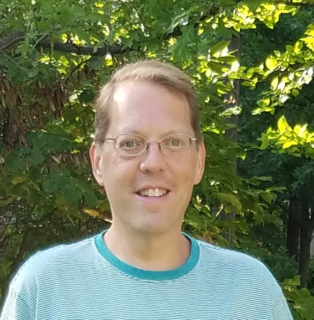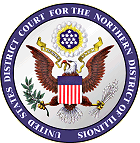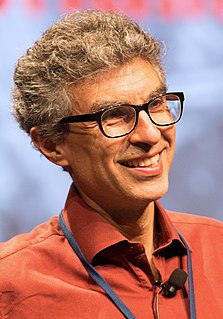An expert witness, in England, Wales and the United States, is a person whose opinion by virtue of education, training, certification, skills or experience, is accepted by the judge as an expert. The judge may consider the witness's specialized opinion about evidence or about facts before the court within the expert's area of expertise, referred to as an "expert opinion". Expert witnesses may also deliver "expert evidence" within the area of their expertise. Their testimony may be rebutted by testimony from other experts or by other evidence or facts.
Douglas Bruce Lenat is the CEO of Cycorp, Inc. of Austin, Texas, and has been a prominent researcher in artificial intelligence; he was awarded the biannual IJCAI Computers and Thought Award in 1976 for creating the machine learning program, AM. He has worked on machine learning, knowledge representation, "cognitive economy", blackboard systems, and what he dubbed in 1984 "ontological engineering". He has also worked in military simulations, and numerous projects for US government, military, intelligence, and scientific organizations. In 1980, he published a critique of conventional random-mutation Darwinism. He authored a series of articles in the Journal of Artificial Intelligence exploring the nature of heuristic rules.
The term "grey hat", alternatively spelled as "greyhat" or "gray hat", refers to a computer hacker or computer security expert who may sometimes violate laws or typical ethical standards, but does not have the malicious intent typical of a black hat hacker.

David A. Bader is a Professor, Chair of the School of Computational Science and Engineering, and Executive Director of High-Performance Computing in the Georgia Tech College of Computing. In addition, Bader was selected as the director of the first Sony Toshiba IBM Center of Competence for the Cell Processor at the Georgia Institute of Technology. He is an IEEE Fellow, AAAS Fellow, National Science Foundation CAREER Award recipient and an IEEE Computer Society Distinguished Speaker. Bader is a leading expert in data sciences. His main areas of research are in at the intersection of high-performance computing and real-world applications, including cybersecurity, massive-scale analytics, and computational genomics.

Digital forensics is a branch of forensic science encompassing the recovery and investigation of material found in digital devices, often in relation to computer crime. The term digital forensics was originally used as a synonym for computer forensics but has expanded to cover investigation of all devices capable of storing digital data. With roots in the personal computing revolution of the late 1970s and early 1980s, the discipline evolved in a haphazard manner during the 1990s, and it was not until the early 21st century that national policies emerged.
IEEE Computer Society is a professional society of IEEE. Its purpose and scope is "to advance the theory, practice, and application of computer and information processing science and technology" and the "professional standing of its members." The CS is the largest of 39 technical societies organized under the IEEE Technical Activities Board.

Erik Laykin is a computer forensics expert and cyber-crime investigator.
Daticon EED, Inc., formerly known as Electronic Evidence Discovery, Inc., is a pioneer in the electronic discovery industry. Since its founding in 1987 by John H. Jessen, the company has contributed to many innovations in the industry and significantly expanded its service offerings and altogether worldwide presence.
H5 is a privately held company specializing in information retrieval systems for the legal industry, with offices in San Francisco and New York City. Founded in 1999, H5 combines advanced proprietary information retrieval technologies with professional expertise in linguistics, statistics, computer science, law, information technology, process engineering and e-discovery. The company completed its third and latest round of venture capital funding in 2005; its primary investors are the private equity firms of Draper Fisher Jurvetson, Institutional Venture Partners (IVP), and Walden VC.

John M. Facciola served as a United States Magistrate Judge for the United States District Court for the District of Columbia, from his appointment in August, 1997 until his retirement in December, 2014. Prior to being appointed to the bench, he served as an Assistant District Attorney in Manhattan from 1969–1973, and was in private practice in the District of Columbia from 1974–1982. Judge Facciola joined the U.S. Attorney's Office in 1982. He served in the Appellate and Civil Divisions and then as Chief of the Special Proceedings section from 1989 until his appointment as Magistrate Judge. He has been an adjunct professor of law at Catholic University and at Georgetown University Law Center, a fellow of the American Bar Foundation and a member of the Board of Governors of the John Carroll Society. He has been the Editor in Chief of the Federal Courts Law Review, the electronic law journal of the Federal Magistrate Judges Association. He is also on the Advisory Board for the Sedona Conference, an organization which brings together attorneys, judges, and experts to help advance the law in a collaborative, just and reasoned manner. Facciola has been a leader in issues related to electronic discovery. He has written a number of opinions and lectures frequently on the topic.
Paul William Grimm is a United States District Judge of the United States District Court for the District of Maryland.

In United States v. Riggs, the government of the United States prosecuted Robert Riggs and Craig Neidorf for obtaining unauthorized access to and subsequently disseminating a file held on BellSouth's computers. The file, referred to as the E911 file, gave information regarding BellSouth's products implementing 911 emergency telephone services. Riggs and Neidorf were both indicted in the District Court of the Northern District of Illinois on numerous charges relating to the dissemination of the E911 text file. As Riggs had previously been indicted in the Northern District of Georgia in relation to the same incident, his charges from Illinois were transferred to Georgia. Riggs ultimately pleaded guilty in Georgia and was sentenced to 21 months in prison and two years' supervised release. Neidorf pleaded not guilty in Illinois and the government dropped all charges against Neidorf four days after the trial began.
Information Discovery is a term used in the legal and corporate industry which refers to the steps involved in distilling a corporation’s data corpus down to the most pertinent evidence pertaining to a court-related matter or compliance directive. The major information discovery steps include: managing the entire data collection in a manner to identify all pertinent evidence associated with the matter, targeting that information for collection, processing and identification (culling) of relevant data, and processing for document hosting and legal document/information review.

Data science is a multi-disciplinary field that uses scientific methods, processes, algorithms and systems to extract knowledge and insights from structured and unstructured data. Data science is the same concept as data mining and big data: "use the most powerful hardware, the most powerful programming systems, and the most efficient algorithms to solve problems".

William A. Lupien is an American business executive in the financial industry. He traded actively in the financial markets throughout his career. He was a Specialist and later Exchange Governor on the Pacific Stock Exchange (PSE), a Nasdaq market maker, the Chairman and CEO of Instinet, the Chairman and CEO of OptiMark Corporation, and the Managing Director of the General Partner of a hedge fund, Kudu Partners LP. He helped develop the world's first electronic trading system. He also served on the Advisory Committee on the National Market System. In 1999 he was featured in a CNBC television series as one of five people who had changed the course of the securities industry in the 20th century.
Gates Rubber Company v. Bando Chemical Industries, Ltd., et al. is a decision by the U.S. district court for the District of Colorado from May 1, 1996. It is to be considered a landmark decision in terms of expert witness court testimony in questions of electronic evidence and digital forensics.

Yoshua Bengio is a Canadian computer scientist, most noted for his work on artificial neural networks and deep learning. He was a co-recipient of the 2018 ACM A.M. Turing Award for his work in deep learning. He is a professor at the Department of Computer Science and Operations Research at the Université de Montréal and scientific director of the Montreal Institute for Learning Algorithms (MILA).
The Sedona Canada Principles are a set of authoritative guidelines published by The Sedona Conference to aid members of the Canadian legal community involved in the identification, collection, preservation, review and production of electronically stored information (ESI). The principles were drafted by a small group of lawyers, judges and technologists called the Sedona Working Group 7 or Sedona Canada. Sedona Canada is an offshoot of The Sedona Conference which is an American “non-profit…research and educational institute dedicated to the advanced study of law and policy in the areas of antitrust law, complex litigation, and intellectual property rights.”









